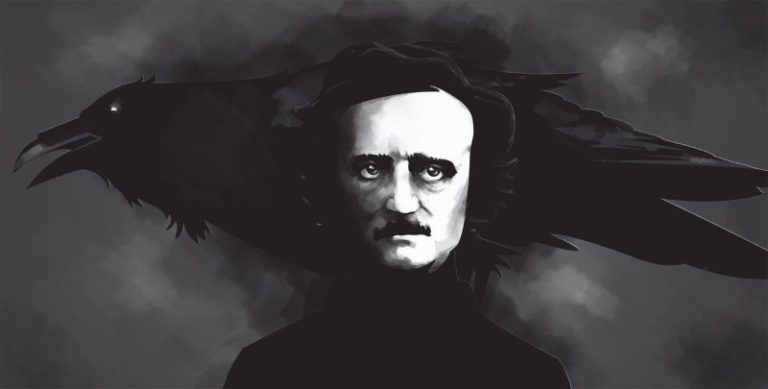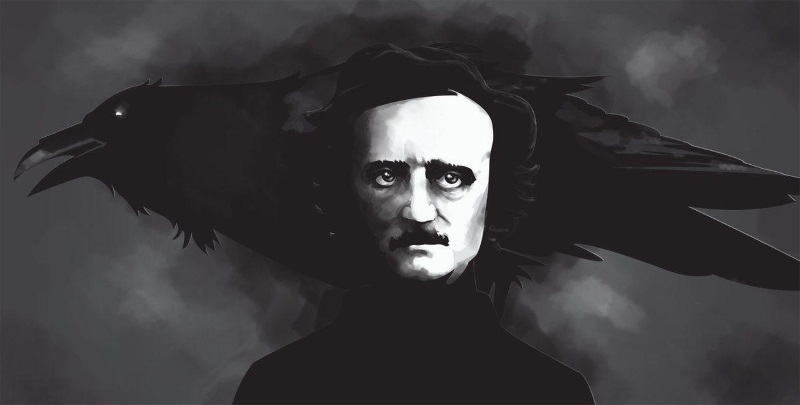
Okay, Edgar Allan Poe never gave screenwriting advice because he lived and died during a time where there was no such thing as a screenplay. However, he did manage to write an interesting essay entitled The Philosophy of Composition — a writing piece that showcased specific writing advice that he shared to all readers.
In it he breaks down varying lessons of writing while using his most famous work — The Raven — as an example.
Poe states, "For my own part, I have neither sympathy with the repugnance alluded to, nor, at any time, the least difficulty in recalling to mind the progressive steps of any of my compositions; and, since the interest of an analysis, or reconstruction, such as I have considered a desideratum, is quite independent of any real or fancied interest in the thing analyzed, it will not be regarded as a breach of decorum on my part to show the modus operandi by which some one of my own works was put together."
Whether Poe was being coy or satirical, we'll never know. In this case, we will err on the side of him trying to communicate his method of madness — pun intended — as he composed what would come to be recognized as one of the greatest suspense stories of all time.
Here we take the words of the originator of detective fiction, master of short story suspense and the macabre, and apply them to the art, craft, and business of screenwriting.
1. Keep It Short, Sweet, and to the Point
"If any literary work is too long to be read at one sitting, we must be content to dispense with the immensely important effect derivable from unity of impression — for, if two sittings be required, the affairs of the world interfere, and every thing like totality is at once destroyed."

There are certainly exceptions to this notion — the novel in particular — but the point Poe was possibly trying to make was that writers need to focus on keeping things — scenes, sequences, and the number of overall pages for a script in the case of the screenwriter — short, sweet, and to the point.
As a former studio reader, I can attest to this perception of length. There's nothing worse than a script that meanders on and on and on.
"... a certain degree of duration is absolutely requisite for the production of any effect at all."
The key point here is that anytime a writer allows the reader's mind to wander, the momentum of the story could be "destroyed." Thus, writers need to make sure that everything within the script exists to engage the reader and offer them the necessary tools to be engaged.
If lines of dialogue go on and on with either no relation to the story and character or if the dialogue is riddled with exposition over-explaining the story or the character's emotions, readers disengage.
If lines of scene description are overly specific and detailed, readers disengage.
If scenes themselves are repetitive or go off on tangents not specifically related to the core concept, core story, and core character arcs relating to the story, readers disengage.
2. Know What Impression You Want to Make
"Throughout the construction, I kept steadily in view the design of rendering the work universally appreciable."
This concept Poe had regarding the installation of going into the process of writing knowing what impression you — the writer — wants to make is key to attaining a strong and solid script. Writers have the power to convey whatever impression they'd like to make within their work.
If you want to shock the audience, go into that script knowing that you want to do that.
If you want to sway the audience towards a certain opinion about an issue or historical piece of history, understand the design of what you are trying to convey.
If you want to make the audience laugh hysterically, search for the hilarity in your concept and find each and every laugh that you can muster.
If you want to make the audience fall in love with two characters as they fall in love with each other, know that this is the center of your script.
If you want to take the audience on a roller coaster ride, go into the process of writing such a script with style and exciting action and adventure sequences that outdo one another as you build, build, and build to the ultimate climax.
3. When in Doubt, Be Original
"The fact is, originality (unless in minds of very unusual force) is by no means a matter, as some suppose, of impulse or intuition. In general, to be found, it must be elaborately sought, and although a positive merit of the highest class, demands in its attainment less of invention than negation."

Impulse or intuition often leads screenwriters into what has already been done before. It's no mistake that script after script and movie after movie often emulate what has come in prior years and decades. Call it an homage, call it inspired by, or what have you.
Originality is something that must be worked on — something that must be sought.
Screenwriters need to ask themselves, "What haven't I seen before?"
In these current turbulent times in Hollywood development and production, the risk averse executives turn to IP (intellectual property) for answers. Yet the scripts that get screenwriters noticed are those that are unlike anything they've seen before. Look no further than the Black List script Mr. Bubbles that told the Michael Jackson story through the eyes and narration of Jackson's pet chimpanzee.
Despite what Hollywood may be showing you, know that originality counts. So go seek it out whenever you can.
4. Location, Location, Location
"The next point to be considered was the mode of bringing together the lover and the Raven — and the first branch of this consideration was the locale."
Poe was of course referring to the writing process of composing his most famous work — The Raven. While detailing his writing process, he stipulates that finding the proper location was key to his story and the characters of the lover and the Raven.
Screenwriters should take note because the locations they choose in their scripts are so important to the tone and atmosphere of the cinematic story. It shouldn't just be about placing characters in any given location. You need to have a deeper meaning to each and every setting you place those characters in.
Amity Island in Jaws was a particular setting that enhanced the suspense and gave the character of Chief Brody a better arc because he was afraid of water and ironically was surrounded by it. If the shark attacks had occurred within the long stretches of a Florida beach, the suspense and character depth wouldn't be as prevalent because there would always be that escape into the mainland.
The island offered a sense of being trapped. Not just for the Brody character, but for the local population and visiting tourists as well.
5. Know the Ending
"I first established in mind the climax, or concluding query."

Poe wrote the end of The Raven first.
"By establishing the climax, I might the better vary and graduate, as regards seriousness and importance, the preceding queries of the lover — and, secondly, that I might definitely settle the rhythm, the meter, and the length and general arrangement of the stanza — as well as graduate the stanzas which were to precede, so that none of them might surpass this in rhythmical effect. Had I been able, in the subsequent composition, to construct more vigorous stanzas, I should, without scruple, have purposely enfeebled them, so as not to interfere with the climacteric effect."
When you know the ending, you can take delight in building up to it by peppering your script with hints, foreshadowing, plants, payoffs, twists, turns, and surprises. The ending then becomes the guiding light that gives screenwriters something to shoot for.
If you don't know the ending and continue to write on, chances are you may discover something great, but you'll have to certainly go back and do extensive rewrites to properly sell that ending you eventually conjured.
Start with the ending and you'll soon find that the frustration of finding direction for each of your acts, each of your characters, and each of your story arcs will be, well, nevermore.

Once upon a midnight dreary, while I pondered, weak and weary,
Over many a quaint and curious volume of forgotten lore—
While I nodded, nearly napping, suddenly there came a tapping,
As of some one gently rapping, rapping at my chamber door.
“’Tis some visitor,” I muttered, “tapping at my chamber door—
Only this and nothing more.”
Ah, distinctly I remember it was in the bleak December;
And each separate dying ember wrought its ghost upon the floor.
Eagerly I wished the morrow;—vainly I had sought to borrow
From my books surcease of sorrow—sorrow for the lost Lenore—
For the rare and radiant maiden whom the angels name Lenore—
Nameless here for evermore.
And the silken, sad, uncertain rustling of each purple curtain
Thrilled me—filled me with fantastic terrors never felt before;
So that now, to still the beating of my heart, I stood repeating
“’Tis some visitor entreating entrance at my chamber door—
Some late visitor entreating entrance at my chamber door;—
This it is and nothing more.”
Presently my soul grew stronger; hesitating then no longer,
“Sir,” said I, “or Madam, truly your forgiveness I implore;
But the fact is I was napping, and so gently you came rapping,
And so faintly you came tapping, tapping at my chamber door,
That I scarce was sure I heard you”—here I opened wide the door;—
Darkness there and nothing more.
Deep into that darkness peering, long I stood there wondering, fearing,
Doubting, dreaming dreams no mortal ever dared to dream before;
But the silence was unbroken, and the stillness gave no token,
And the only word there spoken was the whispered word, “Lenore?”
This I whispered, and an echo murmured back the word, “Lenore!”—
Merely this and nothing more.
Back into the chamber turning, all my soul within me burning,
Soon again I heard a tapping somewhat louder than before.
“Surely,” said I, “surely that is something at my window lattice;
Let me see, then, what thereat is, and this mystery explore—
Let my heart be still a moment and this mystery explore;—
’Tis the wind and nothing more!”
Open here I flung the shutter, when, with many a flirt and flutter,
In there stepped a stately Raven of the saintly days of yore;
Not the least obeisance made he; not a minute stopped or stayed he;
But, with mien of lord or lady, perched above my chamber door—
Perched upon a bust of Pallas just above my chamber door—
Perched, and sat, and nothing more.
Then this ebony bird beguiling my sad fancy into smiling,
By the grave and stern decorum of the countenance it wore,
“Though thy crest be shorn and shaven, thou,” I said, “art sure no craven,
Ghastly grim and ancient Raven wandering from the Nightly shore—
Tell me what thy lordly name is on the Night’s Plutonian shore!”
Quoth the Raven “Nevermore.”
Much I marvelled this ungainly fowl to hear discourse so plainly,
Though its answer little meaning—little relevancy bore;
For we cannot help agreeing that no living human being
Ever yet was blessed with seeing bird above his chamber door—
Bird or beast upon the sculptured bust above his chamber door,
With such name as “Nevermore.”
But the Raven, sitting lonely on the placid bust, spoke only
That one word, as if his soul in that one word he did outpour.
Nothing farther then he uttered—not a feather then he fluttered—
Till I scarcely more than muttered “Other friends have flown before—
On the morrow he will leave me, as my Hopes have flown before.”
Then the bird said “Nevermore.”
Startled at the stillness broken by reply so aptly spoken,
“Doubtless,” said I, “what it utters is its only stock and store
Caught from some unhappy master whom unmerciful Disaster
Followed fast and followed faster till his songs one burden bore—
Till the dirges of his Hope that melancholy burden bore
Of ‘Never—nevermore’.”
But the Raven still beguiling all my fancy into smiling,
Straight I wheeled a cushioned seat in front of bird, and bust and door;
Then, upon the velvet sinking, I betook myself to linking
Fancy unto fancy, thinking what this ominous bird of yore—
What this grim, ungainly, ghastly, gaunt, and ominous bird of yore
Meant in croaking “Nevermore.”
This I sat engaged in guessing, but no syllable expressing
To the fowl whose fiery eyes now burned into my bosom’s core;
This and more I sat divining, with my head at ease reclining
On the cushion’s velvet lining that the lamp-light gloated o’er,
But whose velvet-violet lining with the lamp-light gloating o’er,
She shall press, ah, nevermore!
Then, methought, the air grew denser, perfumed from an unseen censer
Swung by Seraphim whose foot-falls tinkled on the tufted floor.
“Wretch,” I cried, “thy God hath lent thee—by these angels he hath sent thee
Respite—respite and nepenthe from thy memories of Lenore;
Quaff, oh quaff this kind nepenthe and forget this lost Lenore!”
Quoth the Raven “Nevermore.”
“Prophet!” said I, “thing of evil!—prophet still, if bird or devil!—
Whether Tempter sent, or whether tempest tossed thee here ashore,
Desolate yet all undaunted, on this desert land enchanted—
On this home by Horror haunted—tell me truly, I implore—
Is there—is there balm in Gilead?—tell me—tell me, I implore!”
Quoth the Raven “Nevermore.”
“Prophet!” said I, “thing of evil!—prophet still, if bird or devil!
By that Heaven that bends above us—by that God we both adore—
Tell this soul with sorrow laden if, within the distant Aidenn,
It shall clasp a sainted maiden whom the angels name Lenore—
Clasp a rare and radiant maiden whom the angels name Lenore.”
Quoth the Raven “Nevermore.”
“Be that word our sign of parting, bird or fiend!” I shrieked, upstarting—
“Get thee back into the tempest and the Night’s Plutonian shore!
Leave no black plume as a token of that lie thy soul hath spoken!
Leave my loneliness unbroken!—quit the bust above my door!
Take thy beak from out my heart, and take thy form from off my door!”
Quoth the Raven “Nevermore.”
And the Raven, never flitting, still is sitting, still is sitting
On the pallid bust of Pallas just above my chamber door;
And his eyes have all the seeming of a demon’s that is dreaming,
And the lamp-light o’er him streaming throws his shadow on the floor;
And my soul from out that shadow that lies floating on the floor
Shall be lifted—nevermore!
Ken Miyamoto has worked in the film industry for nearly two decades, most notably as a studio liaison for Sony Studios and then as a script reader and story analyst for Sony Pictures.
He has many studio meetings under his belt as a produced screenwriter, meeting with the likes of Sony, Dreamworks, Universal, Disney, Warner Brothers, as well as many production and management companies. He has had a previous development deal with Lionsgate, as well as multiple writing assignments, including the produced miniseries Blackout, starring Anne Heche, Sean Patrick Flanery, Billy Zane, James Brolin, Haylie Duff, Brian Bloom, Eric La Salle, and Bruce Boxleitner. Follow Ken on Twitter @KenMovies
For all the latest ScreenCraft news and updates, follow us on Twitter and Facebook!
Tags
Get Our Screenwriting Newsletter!
Get weekly writing inspiration delivered to your inbox - including industry news, popular articles, and more!



























